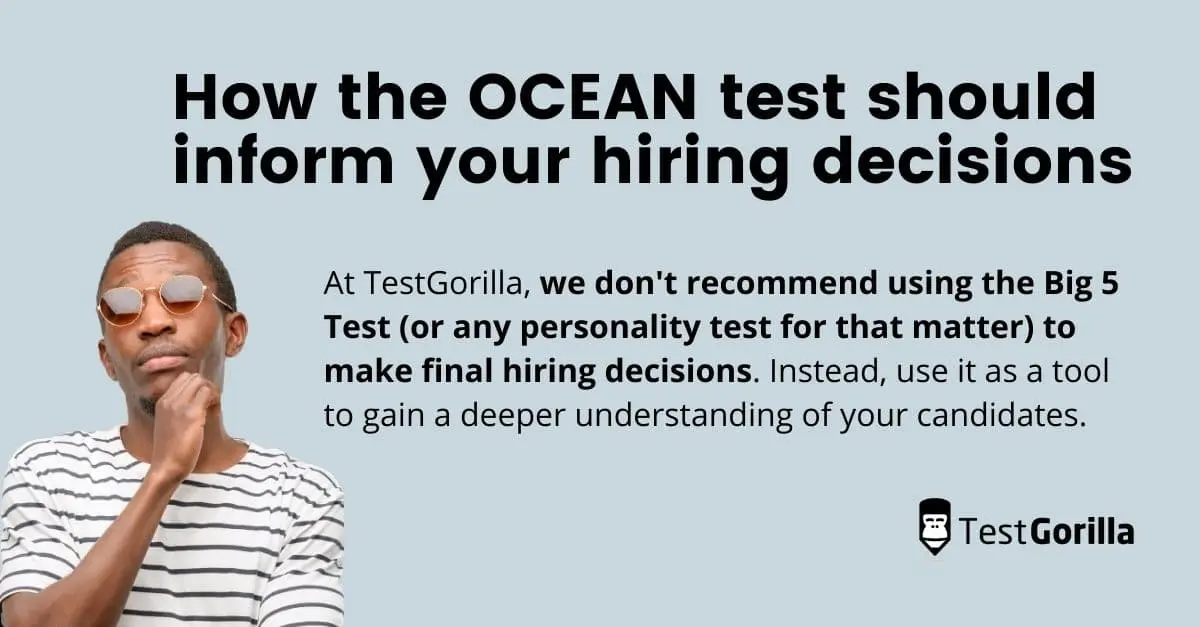Generally, you’ll learn a lot about a new hire over the first few months of employment. These details could include specifics such as a preference for solo or group work, how they solve problems, and how they deal with workplace conflict.
These details are important, but consider how much time it will take to suss them out over those few crucial months of employment. Now imagine that you could get those important insights into your new employee before their first day—or even before you read their resume!
If you use a personality test like the Big Five (OCEAN) test) in your pre-employment assessments, you can.
Table of contents
What is the Big Five (OCEAN) personality test?
The Big Five (OCEAN) personality test measures your scores on what it perceives as the five main dimensions of your personality:
Openness
This is a trait that shows how open to new experiences a candidate is. In other words, it measures how much an individual shows a natural leaning towards experiences that are exciting, unfamiliar, and adventurous.
Someone who scores high on openness will have a tendency towards being more creative and are happy to consider abstract concepts. On the other hand, someone who achieves a low score in Openness may be more pragmatic and focused.
Conscientiousness
This next trait measures how organized, disciplined, and reliable an individual may be. They will be able to get their priorities in order easily and will be more likely to stick to a plan throughout their day. A low score in conscientiousness may indicate high levels of openness and risk-taking, but reliability may need to be worked on.
Extroversion
Simply explained, extroverts and introverts gain their greatest amounts of positive energy from others, or from being alone.
Those who score as extroverts are characters that tend to be naturally excitable, exuberant, talkative, and impulsive. Emotionally, people with this personality trait will tend to be more expressive.
Extroverts will be great team-players, enjoying the bounce back and forth of ideas and energy to be gained from group working. In contrast, introverts will naturally thrive in low-key settings and will tend to be quieter, calmer, and more methodical in their approach to work and life. They also tend to be reserved, private, and contemplative. Introverts will tend to prefer to work alone, and will carefully consider an idea before communicating it.
Agreeableness
Simply put, this is a key factor in showing how easily a person may be to get along with. Those who score highly in this category will tend to show key prosocial attributes such as altruism, kindness, and affection; however, they may also be naïve and submissive. People who score lower in this category tend to be more competitive and argumentative, and sometimes antagonistic toward others.
Neuroticism
A high score on the neuroticism part of the test may indicate an individual’s tendency towards emotional vulnerability. These individuals may benefit from working in calmer environments with more predictable levels of stress, rather than an individual with a low score, who will be equipped to cope more adequately with tension and stress.
Unique personality patterns drive an individual’s actions; understanding these actions and the thought patterns behind them will provide a unique insight into the dynamics of your workplace.
The benefits of the OCEAN personality test
Personality tests offer a range of benefits during the hiring process. For example, they help employers understand their employees both as individuals and as part of a team.
By using the Big 5 test, you can begin to map out an employee’s workplace potential before their first day. And your employees can use their results to better understand how to play to their strengths and what areas they may need to work on.
How to use the Big Five personality test
By getting a deep understanding of employees’ social and emotional behaviors, employers can better grasp the individual dynamics of their workplace, building a strong and empathetic workplace culture.
The OCEAN model is one of the most widely used and popular personality test models used worldwide.
Improve empathy and understanding between workers, managers, and co-workers
We all have a recipe for success tucked away inside us. You wouldn’t use your printer to hold your pens, and you wouldn’t expect your desk to be proficient as a word processor. In the same way, understanding how to communicate with each employee on their own individual level will improve trust and a greater appreciation of employee strengths.
Guide professional development
When it is possible to see your personality and individual traits arranged in a cohesive manner, it is easy to see your own strengths and weaknesses, areas to celebrate, and areas that may need some work.
For example, you may score highly on openness, and therefore you could consider exploring more ways to be creative within your current role. Verified by actual data, your manager will also be able to see ways they can support you in your goals.
Enhance the interview process
When using a personality test as part of the recruitment process, the employer is making a conscious decision to base their recruitment drive on personality, as well as an individual’s skill set. These days, more employers are recognising that skills alone are not enough to make an employee the right fit for a company.
When using data that is possible to compare and consider, employers are more likely to make a decision that will both individual and group success, in terms of the office team and the employee themselves.
How the OCEAN test should inform your hiring decisions
We don’t recommend using the Big 5 Test (or any personality test for that matter) to make final hiring decisions. Instead, use it as a tool to gain a deeper understanding of your candidates’ inclinations. The insights you get into your candidates’ personality traits can help enrich learning and development conversations.
Add personality testing to your tool belt with the Big 5
The results of the Big 5 test will provide you with vital insights the personality traits that characterize each candidate’s behavior. Use this understanding of their strengths, opportunities for improvement, and how they relate to others to guide you during the hiring process and afterward. But as with all assessments, remember: multi-measure assessments work best!
Frequently asked questions
How are personality tests scored?
Candidates will be asked to agree or disagree, on a scale of 1 to 5, to each phrase. Based on your answers, your results will show you where you fall on a spectrum for each trait. For example, you might score high in conscientiousness and low in extraversion. You can take the Big Five inventory for yourself here.
How long is the Big Five (OCEAN) personality test?
The OCEAN test doesn’t take long to complete. TestGorilla’s Big Five test takes no more than ten minutes to complete. The test consists of statements that the candidate rates in terms of how personally true they are on a five-point scale where 1=Disagree, 3=Neutral and 5=Agree.
What is the Big Five test used for?
The Big Five (OCEAN) personality test evaluates candidates across five personality traits: openness to experience, conscientiousness, extraversion, agreeableness, and neuroticism.
Related posts
Hire the best candidates with TestGorilla
Create pre-employment assessments in minutes to screen candidates, save time, and hire the best talent.
Latest posts
The best advice in pre-employment testing, in your inbox.
No spam. Unsubscribe at any time.

Hire the best. No bias. No stress.
Our screening tests identify the best candidates and make your hiring decisions faster, easier, and bias-free.
Free resources
This checklist covers key features you should look for when choosing a skills testing platform
This resource will help you develop an onboarding checklist for new hires.
How to assess your candidates' attention to detail.
Learn how to get human resources certified through HRCI or SHRM.
Learn how you can improve the level of talent at your company.
Learn how CapitalT reduced hiring bias with online skills assessments.
Learn how to make the resume process more efficient and more effective.
Improve your hiring strategy with these 7 critical recruitment metrics.
Learn how Sukhi decreased time spent reviewing resumes by 83%!
Hire more efficiently with these hacks that 99% of recruiters aren't using.
Make a business case for diversity and inclusion initiatives with this data.


















